WARRIOR
NATION
A History
of the
Red Lake
Ojibwe
ANTON TREUER

Text 2015 by Red Lake Band of Chippewa Indians. Other materials by the Minnesota Historical Society. All rights reserved. No part of this book may be used or reproduced in any manner whatsoever without written permission except in the case of brief quotations embodied in critical articles and reviews. For information, write to the Minnesota Historical Society Press, 345 Kellogg Blvd. W., St. Paul, MN 551021906.
Boundaries depicted in the maps used in this book do not represent the legal position of the Red Lake Band of Chippewa Indians nor limit any future claims or disputes relating to boundaries.
www.mnhspress.org
The Minnesota Historical Society Press is a member of the Association of American University Presses.
Manufactured in the United States of America
10 9 8 7 6 5 4 3 2 1
 The paper used in this publication meets the minimum requirements of the American National Standard for Information SciencesPermanence for Printed Library Materials, ANSI Z39.481984.
The paper used in this publication meets the minimum requirements of the American National Standard for Information SciencesPermanence for Printed Library Materials, ANSI Z39.481984.
International Standard Book Number
ISBN: 9780-873519632 (paper)
ISBN: 978-0873519687 (e-book)
Library of Congress Cataloging-in-Publication Data
Treuer, Anton.
Warrior nation : a history of the Red Lake Ojibwe / Anton Treuer.
pages cm
Includes bibliographical references.
ISBN 978-0-87351-963-2 (pbk. : alk. paper) ISBN 978-0-87351-968-7 (ebook)
1. Red Lake Band of Chippewa Indians, MinnesotaHistory. 2. Red Lake Band of Chippewa Indians, MinnesotaPolitics and government. 3. Red Lake Band of Chippewa Indians, MinnesotaBiography. 4. Ojibwa IndiansGovernment relations. 5. Red Lake Indian Reservation (Minn.)History. 6. Red Lake Indian Reservation (Minn.)Biography. I. Title. II. Title: History of the Red Lake Ojibwe.
E99.C6T76 2015
977.00497333dc23
2015028414
This and other Minnesota Historical Society Press books are available from popular e-book vendors.
Warrior Nation was designed and set in type by Judy Gilats. The text face is Cardea and the display faces are Railroad Gothic and Benton Sans.
For Thomas J. Stillday and Anna C. Gibbs, who bridged the knowledge of Leonard Hawk, Dan Raincloud, Nodin Wind, and the ancient ones before them to the present generation and dedicated their lives to ensuring the future vitality and legacy of Red Lake ceremonial life for the benefit of Ojibwe people everywhere.

For my son, Elias Treuerthe blood of chiefswith high hopes that you can study the amazing accomplishments of the great political and spiritual leaders of our people and use those lessons to help make the world a better place.

And for Justin Beaulieu, Samuel Strong, Vincent Staples-Graves, Marguerite Secola, Marcus Tyler, Harvey Roy III, Elizabeth Strong, Rose Barrett, Bryanna Grimes, Don Kingbird, Donovan Sather, Delana Smith, Nate Taylor, Stacey Thunder, Wes May, Roger Spanky White, Liz White, Tito Ybarra, and all the other young citizens of Red Lake who have already devoted so much of their energy to the betterment of the Red Lake people. The political patrimony, culture, and language of this incredible native nation are already in your hands. I believe in it. And I believe in you.
Authors Note
Warrior Nation is a political history of Red Lake. It is organized in seven main chapters, each a biography of an important Red Lake leader at a different point in time. Red Lake had many important historical figures, and telling Red Lakes history through these leaders is not intended to diminish any others. Each biographical feature should be seen not as the most important person of his or her time, but as a window into the evolving political culture of the Red Lake nation. This work tries to include the contributions of women at Red Lake even though it is a political history and, until recently, Red Lakes political leaders were primarily men. This effort is addressed in the narrative directly and through the chapter on Anna Gibbs. The research process, available historical resources, and the direct participation of Red Lakes tribal council in this project also shaped the work. A more thorough discussion of these issues prefaces the bibliography.
WARRIOR NATION
Battle River
Ojibwe runners sprinted through the village near Ponemah Point on the north shore of Lower Red Lake with the call to arms. Dakota warriors were on the east shore of the lake several miles away, and they were prepared to kill or drive out all of the Ojibwe in the region. They had already killed one Ojibwe trapper and wounded another. Ojibwe warriors grabbed their war clubs, spears, and bows. It was about 1760, and a couple of men even had muskets, obtained in trade with the French at Lake Superior. The Ojibwe sallied forth by the hundreds, gathering strength from scattered wigwams and settlements along the north shore of the lake as they sped toward their enemy, most by canoe and others on foot, eager to defend their homes and families. They approached the mouth of a small river, known at the time simply as Zaagiing (the outlet), and found hundreds of Dakota massing on the banks of the river, ready to fight.
The Ojibwe had just established a village at the narrows between Upper and Lower Red Lakes over the preceding year. The area would later be called Ponemah Point (Obaashiing), and a village and population center five miles to the east would be known as both Cross Lake (Aazhooding) and Ponemah. The Ponemah Ojibwe were part of a large front of Ojibwe that had attacked the Dakota with many hundreds of warriors and had driven them from their homes. The late Fannie Johns (Ogimaakwe, or Queen) from Red Lake said that when the Ojibwe first settled there Ponemah was the only Ojibwe settlement at Red Lake and the Dakota still lived in villages along the south shore. They could see the distant smoke from one anothers fires every day. The Dakota sent numerous scouts to Ponemah to evaluate their enemys strength and determine the best time and place to attack. Johns said there were three Ojibwe medicine men in Ponemah who performed a ceremony with hand drums, fire, and medicine to obscure the village and create an illusion of overpowering numbers to deter Dakota attacks. She said the effect was so profound that hundreds of Dakota abandoned the idea of driving the Ojibwe out of Ponemah and voluntarily packed up their families to move west where hunting was easier and their families would be free from the danger of continued warfare. When the Dakota who stayed finally rallied their warriors to drive the Ojibwe out, their numbers were already greatly reduced from the voluntary relocation of many Dakota families.
The Ojibwe occupation of Ponemah came as part of a much larger territorial advance where the Ojibwe displaced the Dakota from their villages in many places at Leech Lake, Lake Winnibigoshish, and the area surrounding Upper and Lower Red Lake. In Ponemah, the Ojibwe immediately built wigwams and palisades, bringing their children and elders there to live, with full knowledge that the Dakota would come back to challenge the Ojibwe claim to the land. Today some people marvel at the bravery and audacity of the territorial claim of the Ojibwe and their apparent reckless willingness to risk the lives of their entire families to make Red Lake their home. This was due in part to the fact that the Ojibwe warriors were also full-time providers, and there was no way to leave dependents behind in cases of war or they would surely starve. But the Ojibwe were also warriors. They had fought their way west for generationslong before European contact. From their original homeland on the Atlantic Coast, the Ojibwe had forayed west through the eastern and central Great Lakes for more than fifteen hundred years. The population density on the East Coast was very high, and food shortages caused by occasional droughts sometimes created intense conflict between the numerous indigenous groups there over the land. As the Ojibwe defended themselves from the Iroquois Confederacy and other tribes in the east, prophets appeared among them with a series of visions and a powerful message to move west to the land where food grows on water. This clear reference to wild rice is a big part of what brought the Ojibwe through the Great Lakes to Red Lake.


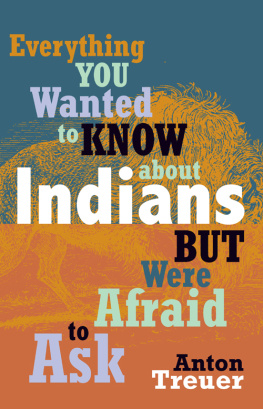

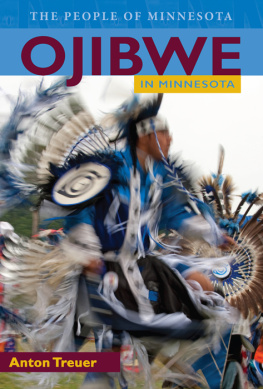
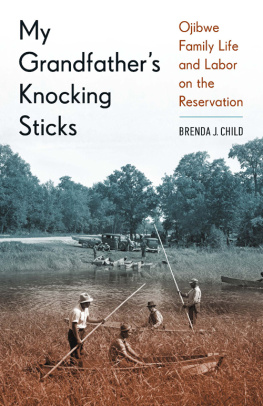
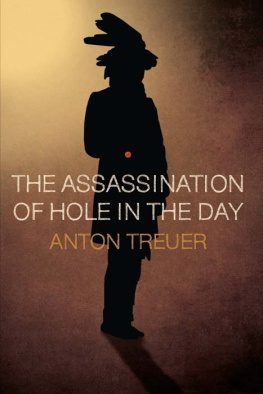
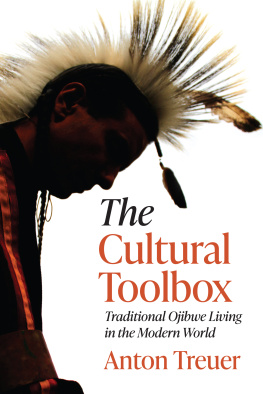
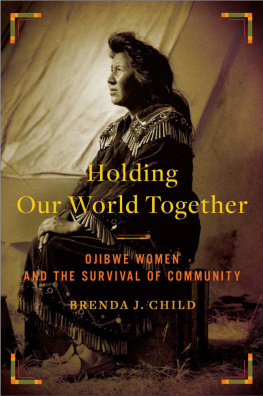
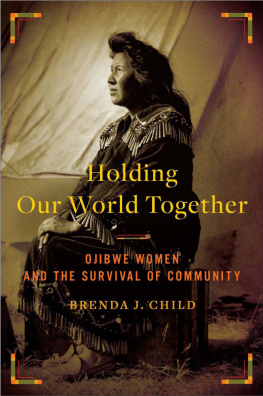

 The paper used in this publication meets the minimum requirements of the American National Standard for Information SciencesPermanence for Printed Library Materials, ANSI Z39.481984.
The paper used in this publication meets the minimum requirements of the American National Standard for Information SciencesPermanence for Printed Library Materials, ANSI Z39.481984.